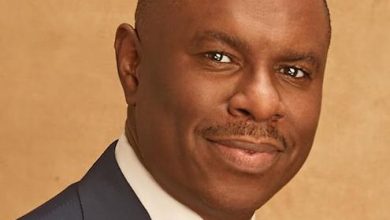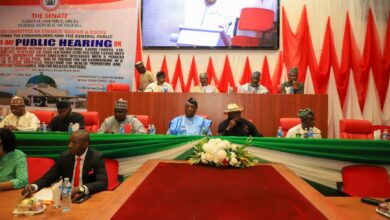
By Emmanuel Onwubiko
“The priority of any addict is to anaesthetize the pain of living to ease the passage of day with some purchased relief.”-Russell Brand on drug abuse.
Nigeria at the moment is a nation that is challenged, hobbled by multifaceted, multidimensional problems associated with insecurity.
One of the causative agents of violence or rather one of the factors that precipitate violent crime is addiction to drugs by most of those who commit crime or terrorism. This conclusion is unassailable.
In the light of the above, can you imagine how the state of violence would look like if Nigeria is allowed to slip off, degenerate and become a drugs haven like Ecuodor, Mexico, Columbia or Guatemala which are all located in South America. If this happens, this our nation that we are all crying that killings are becoming too much will become like somewhere still hibernating in the state of nature in which life becomes short, uninteresting, brutish, miserable, and might becomes right, just as Thomas Hobbes wrote about and Moral philosophers warned us against.
This is why providing support as citizens to the men/women and officers of the National Drugs Law Enforcement Agency led by one of AFRICA’S BEST and Nigeria’s hard working erstwhile governor of the largest state in Nigeria Lagos-Brigadier General Mohammed Buba Marwa (rtd), makes a lot of sense.
Going forward, I will provide three latest developments in the counter narcotics warfare Worldwide which should serve as effective moral booster for Nigerian citizens to immediately and comprehensively support the NDLEA.
The first story is about the nation of Ecuodor in which drug barons have so much influence and are mafia lords that manipulate the civil populace to embrace negative narrative regarding the vehement crusade by the United States of America to get all the drug lords extradited to the USA to face justice for their narcotics related organised crime.
Can you imagine that Nigeria degenerates to the gutter level whereby drug barons bribe the civil populace to stage riotous protests against the constituted authority all in the name of mounting inordinate pressure for the National government to stop extradition drug offenders wanted in the United States of America on the lawful request of the government of USA. Nigeria for now, supports and carries out lawful extradition of drug related offenders to the USA. If Nigeria then becomes like Ecuodor, the whole Country will be in a state of organised chaos, anarchy and doom.
In Ecuador, the Civil populace have been successfully manipulated and remote controlled by drug barons to wage war against the proposed constitutional reforms to legalise extradition of drug offenders to the United States of America. The extradition of Ecuadorans is prohibited by the constitution of the South American country, which has been rocked by a dramatic increase in criminal violence.
Lasso, an unpopular conservative and former banker, proposed legalizing extradition as a means of fighting drug trafficking and a crime wave that claimed the lives of two candidates in local elections held alongside the referendum.
On Sunday, the matter was put to a mandatory referendum for Ecuador’s 13.4 million eligible voters. With 96 percent of ballots counted by Monday, the “No” vote led “Yes” by 51 percent to 49 percent, according to results published by the National Electoral Council (CNE).
“I acknowledge that the majority does not agree with those issues being resolved with the tools under consideration in the referendum,” Lasso said in a speech carried on national TV and radio.
He called for a national debate on what to do about drug trafficking and what he called its links to politics.
Geographically and historically, Ecuador is sandwiched between Colombia and Peru, the world’s two largest cocaine producers, and has itself become a hub for the global drug trade in recent years.
Report says despite not having any major drug plantations or cartels of its own, nor big laboratories for refining cocaine, Ecuador is listed by the United States as one of the top 22 drug-producing or transit countries in the world. Drugs produced elsewhere are shipped from Ecuador’s Guayaquil port to the United States, Europe and Asia, reports the media.
This has resulted in a bloody territorial war between gangs — some with ties to Mexican cartels, according to the authorities — who brutally kill each other on the streets and in Ecuador’s overcrowded jails, according to press report recently.
Ironically, the murder rate in the country of 18.2 million almost doubled between 2021 and 2022, from 14 to 25 homicides per 100,000 inhabitants, according to official figures. Drug seizures have skyrocketed and prison massacres have left more than 400 inmates dead since 2021.
Media reports asserted that this failed referendum is a litmus test for the president. This is because, in neighboring Colombia, extradition to the United States has proven to be a useful weapon against drug traffickers, though cocaine production is still booming.
Allowing extradition was one of eight constitutional changes proposed in Ecuador’s referendum, which went hand-in-hand with elections for mayors, municipal and neighborhood councils, and a body that nominates people to key oversight posts.
The vote was seen as a political test for Lasso, who took office in 2021 and has an unpopularity rating of 80 percent, according to a recent poll.
The opposition Citizen Revolution movement led by former socialist president Rafael Correa campaigned for the rejection of Lasso’s proposed constitutional reforms.
In other defeats for Lasso in Sunday’s voting, the mayoral jobs in the country’s two largest cities, Quito and Guayaquil, went to people who support Correa. Effectively, Ecuador is in the pockets of drug mafia lords.
The second story is about a report by the United Nations Office on Drugs and Crime (UNODC) which showed that opium poppy cultivation in Myanmar surged in 2022 reaching the highest-ever estimates since they started measuring it nine years ago. This comes a year after the country’s military seized power marking a reversal of the steady decline in the production of the illicit crop between 2014 and 2020, the report noted.
The UN estimates that cultivation of the illicit crop is up by at least 33 per cent this year while the evidence also points towards increasing sophistication in the practices, the report noted, as the newly sampled areas for the survey showed more cultivation in high-density poppy cultivation hotspots. According to the UN report, opium production in 2022 has been the highest since 2013 when it peaked at 870 metric tonnes.
Last year, the area of opium poppy cultivation was nearly 40,100 hectares which is at least 10,000 hectares more than in 2021, which was also the year that the military seized power in Myanmar, found the UN survey. The report also noted that the amount of poppy cultivated in 2022 can yield at least 790 metric tonnes of the highly addictive narcotic, opium.
This growth has also been attributed to economic hardship, political instability and insecurity. “Econverged, and farmers in remote, often conflict-prone areas in northern Shan and border states have had little option but to move back to opium,” said UNODC Regional Representative Jeremy Douglas.
The region that the UN representative refers to is where Myanmar, Thailand, and Laos meet which is also a jungle territory known as the Golden Triangle. The region has historically been known for being a lucrative hub for the illegal drug trade and a source of opium and heroin production. Furthermore, the UN report also noted that there has been a 70 per cent year-on-year decline in “eradication efforts”.
Myanmar’s opiate economy is valued somewhere between $660 million to $2 billion, which amounts to one to three per cent of the country’s GDP in 2021, said the UN. Myanmar is also the world’s second-largest producer of opium, after Afghanistan. Furthermore, the report also noted domestic and international pressures like the aftermath of the COVID-19 pandemic, the Russia-Ukraine conflict, political instability and soaring inflation have provided a “strong incentive for farmers in Myanmar to take up or expand opium poppy cultivation”.
“At the end of the day, opium cultivation is really about economics, and it cannot be resolved by destroying crops which only escalates vulnerabilities…Without alternatives and economic stability, it is likely that opium cultivation and production will continue to expand,” said Douglas, in a statement.
Myanmar degenerated due to collapse of governance and the illegal overthrow of the democratically elected government. So, if Nigerians are not vigilant enough to work to actualize free, fair, transparent and fair General election next Month, the chances are that Nigeria’s current war on Drugs will collapse. This is because bad government that comes to power through unpopular fashion and by hook and crook, will inevitably be controlled by drug lords who are amongst the highest occupants of the hierarchy of men of the underworld.
It is therefore in our collective self enlightened interest not to be naive and go to sleep and allow criminals and terrorists to hijack the February Presidential election. If the largest black nation in the World returns to the infamous ranking as the hub of drug lords, then Africa as a whole is in big crisis because if Nigeria coughs, Africa catches cold.
In Mexico, the third story played out and it is all about the recent arrest of Ovidio Guzmán, son of the infamous Mexican drug cartel leader Joaquín ‘El Chapo’ Guzmán, made international news not only because of the identity of the suspect but because of the unprecedented violence his foot soldiers waged in the Sinaloa state of Mexico in the aftermath.
Guzmán’s arrest took place on Jan. 5 near Culiacán, the capital of the Mexican state of Sinaloa. The operation reportedly planned by the Mexican forces for six months left 29 people, including 10 military personnel, dead.
While the captive was quickly airlifted to Mexico City, his gang—Los Chapitos, presumably, a faction of the Sinaloa Cartel—set up roadblocks, burned vehicles and engaged in shootouts with the authorities, using machine guns and 50-caliber rifles, capable of penetrating armored vehicles. The violence spread from Culiacán, where Guzmán was born in 1990, to other parts of the state.
“The violence that ensued was just a desperate attempt to stop something that had already happened,” says Pablo Calderon Martinez, assistant professor of politics and international relations at Northeastern University-London.
Guzmán was arrested once before in 2019, but the authorities had to release him because the cartel threatened public safety.
Guzmán’s arrest might mean justice for hundreds of victims of the Sinaloa cartel and families that were destroyed by the drug trade and its violence, Calderon Martinez says. But otherwise, it doesn’t change Mexico’s struggle with drug trafficking and drug cartels.
Geography makes Mexico particularly vulnerable to drug-related activity, Calderon Martinez says.
The Mexico-United States border is the busiest border in the world. It is also the tenth longest land border between two countries. Trillions of dollars in goods and services are moved back and forth, Calderon Martinez says, and the busy, porous border allows for the movement of drugs.
Mexican cartels make big money not on making illegal drugs or selling them, but on moving drugs to the U.S.—the largest drug market.
“That is why Mexican drug organizations became more prosperous than Colombian organizations,” Calderon Martinez says.
They control billions of dollars in capital and cash, he says. This money can buy them weapons, vehicles and soldiers. Cartels run their own armies and pay salaries.
“It is just impossible to expect local law enforcement to challenge what is basically a well-funded military force,” Calderon Martinez says.
Only the armed forces of Mexico and Mexican Navy could really fight cartels, he says, but it takes time to mobilize them to a particular location across the country.
“The state has to make a decision as to how much it spends on fighting a drug cartel and a criminal organization and other things that the state needs to do,” Calderon Martinez says, meaning, for example, expenditures on education or health care.
Calderon Martinez believes that it is simply impossible to get rid of drug trafficking organizations. Supporting Marwa’s NDLEA and the aggressive but law based counter narcotics warfare makes a whole lot of sense so Nigeria does not become a jungle of hard drugs in which case only the armed forces can combat. This will be tough because of the war on terror. If the Armed forces of Nigeria should equally be fully involved in the counter narcotics war, the military of Nigeria may not have those kinds of capacity and the United States of America may not be in a mad rush to provide technical assistance by then in such a rapid fashion that will occasion quick win approach to both wars on terror and counter narcotics warfare.
Supporting Marwa’s NDLEA will turn Nigeria into a nation that does not tolerate drugs like the USA.
Recently, a federal judge sentenced a high-level Guatemalan cartel boss to 210 months in federal prison on Jan. 27.
According to public documents, officials identified William Estuardo Lemus-Lara, aka Humilde, 51, as the leader of a transcontinental criminal organization that moved tons of cocaine from South America via maritime smuggling routes to conspirators in northwest Guatemala and Mexico. Conspirators then smuggled the drugs into the United States.
Lemus-Lara was the head of the organization, and despite the United States’ best efforts to stymie his cocaine operation, he was a prolific trafficker. As the government described in its sentencing papers, a snapshot of Lemus-Lara’s operation provided unparalleled insight into his cocaine-trafficking prowess. During a five-day period in May 2017, Lemus-Lara coordinated and oversaw a smuggling venture involving four cocaine-laden vessels. Through this investigation, three of those vessels were interdicted by the U.S. Coast Guard and the Guatemala FEN, which is Guatemala’s Naval Special Forces. The vessels were carrying between 810 and 914 kilograms of cocaine each. A fourth boat made it through and delivered 814 kilograms of cocaine to Lemus-Lara and his organization.
Homeland Security Investigations (HSI) and the Drug Enforcement Administration targeted Lemus-Lara as part of a long-term joint investigation. The investigation led to indictments and extradition of several high-level South- and Central American drug traffickers, including many, like Lemus-Lara, from Guatemala.
“This sentencing of Lemus is the culmination of years of collaborative efforts between HSI, DEA, the U.S. attorney’s office and government of Guatemala,” said HSI San Diego Special Agent in Charge Chad Plantz, “The joint effort has significantly impacted this international criminal organization’s ability to import dangerous drugs into the United States.”
“International drug trafficking organizations are driving addiction and overdose deaths in the United States,” said DEA Special Agent in Charge Shelly S. Howe. “Today’s sentencing of Lemus-Lara is a win for DEA and our law enforcement partners. We are committed to stopping these organizations from bringing large quantities of drugs into our country and holding their leaders accountable.”
By way of conclusion, let me remind my readers of the case of Nigeria’s track and field runner, Divine Ododuru, alleged to be the ‘Athlete 2’ in the Blessing Okagbare’s doping scandal, has been provisionally suspended by World Athletics’ Athletics Integrity Unit (AIU) for possession/use or attempted use of a Prohibited Substance.
In a release on its website, the AIU said it has notified the 26-year-old of ‘two potential Anti-Doping Rule Violations (ADRVs) and is seeking a six-year ban against the Nigerian.
Oduduru has been notified of potential ADRVs for possession (Rule 2.6 of the World Athletics Anti-Doping Rules; ADR) and/or use or attempted use of multiple Prohibited Substances (Rule 2.2 ADR).
According to the AIU, ‘these alleged violations stem from an AIU investigation based on information in a criminal charge brought against US-based ‘naturopathic’ therapist Eric Lira, on January 12, 2022, by the United States Department of Justice under the Rodchenkov Act.
Lira is alleged to have supplied performance-enhancing drugs to athletes before the Tokyo 2020 Olympic Games (delayed until summer 2021 because of the COVID-19 pandemic).
‘‘The complaint against Lira provides specific information regarding persons identified as ‘Athlete 1’ and ‘Athlete 2.’ The AIU said ‘in February 2022, a sole arbitrator of the AIU Disciplinary Tribunal concluded that they were ‘comfortably satisfied’ that ‘Athlete 1’ was Oduduru’s team-mate, Blessing Okagbare, and banned her from the sport for ten years, which was increased to an 11-year ban in June 2022 following further charges brought by the AIU.
“Based on information in the complaint, including text conversations imaged from Okagbare’s mobile phone by the Federal Bureau of Investigation (FBI) and further evidence obtained from the AIU investigation, the AIU alleges that Oduduru is ‘Athlete 2’ identified in the complaint.’
The three-time African Games and three-time African Championships medallist has been linked to Texas-based “naturopathic” therapist, based on information into a criminal charge against Lira.
‘Athlete 1’ in this case was found to be sprint and long jump world medallist, Blessing Okagbare, who has been given a 10-year ban.
Supporting war on Drugs will help sanitise the sports industry which is a multibillion dollars sector.
Lastly, the Chairman and Chief Executive Officer, National Drug Law Enforcement Agency (NDLEA), Mohammed Marwa, said the agency has secured 3,733 convictions of drug dealers in 24 months. This is the clearest to show why Nigerians need to support NDLEA.
General. Marwa, who said this recently in Abuja while briefing journalists on the activities of NDLEA during his tenure, said 26,458 drug traffickers including 34 drug barons, were also arrested within the period.
He said 2,346 convictions were recorded in 2022 alone, the highest in the history of the agency and almost doubled the highest ever recorded in the 33 years of NDLEA.
He added that the agency also counselled 19,401 addicts during the period.
“In 2022, I issued a New Year appeal to them and also warned that those who refused to heed the warning will find themselves in a difficult situation.
“Already, we have 34 barons in our net and they are facing the music in court. We have secured orders for the temporary forfeiture of their assets.
“In these two years, we arrested 26, 458 drug traffickers, among them, 34 barons. In 24 months, we successfully prosecuted 3,733 offenders, who were convicted and handed various jail terms in court.
“This is not happenchance but a result of professionalism, determination, commitment and hard work of our officers, men and women,” he said
Mr Marwa, a retired brigadier general, described 2022 as an epoch year, saying that the agency had taken giant leap in drug demand reduction.
He said that the inauguration of the NDLEA drug abuse call centre had broadened access to treatment and rehabilitation.
“It is a year that NDLEA has unprecedented support too, notably from the Governors’ Wives Forum, which made commitments to broaden and deepen social efforts to ameliorate the consequences of drug abuse,” the chairman added.
General. Marwa warned that unrepentant drug barons and cartels would face tougher time in 2023, promising to ensure that they spend long time in prison and lose their wealth and assets.
“The signs are clear: we have already, in the first two weeks of this year taken down three major drug cartels, one of which has built extensive networks across the world while at least six of their kingpins are in our custody as I speak.
“The details you will get to know in the coming days.
“We also had support from our international partners, chiefly the UNODC, counterparts and governments of the United States, France, Germany, United Kingdom, India, and South Korea.
“The support came in the form of donations of equipment, training, intelligence and other logistics,’’ he added.
The NDLEA boss assured Nigerians that the agency was firmly on the task of making Nigeria safe from illicit substances, adding that it was achievable.
He said that NDLEA would sustain its offensive action and shut down the drug route from other countries into Nigeria.
The chairman pledged that the agency would broaden access to treatment and rehabilitation, and carry Nigerians along on the journey to curb trafficking and abuse of substances in the country.
The proactive NDLEA Chairman warned citizens to be wary in their dealings with people of questionable wealth, saying that the anticipated amendment of the NDLEA Act would strengthen the arm of the agency in its drug law enforcement.
“We look forward to arresting more barons and the 34 in the net presently will know their fate in court in the weeks and months ahead.
“The Proceed of Crime Act 2022 enacted last year has given us new leverage and I will like to remind those who benefit from the proceeds of drug crimes, this time – families, friends and associates, that our investigations are thorough.
“And where we find any link between a drug baron and private citizens, we shall scrutinise their assets. The onus is now on every citizen to be honest in their financial dealings with people whose source of wealth is suspect,’’ he said.
He expressed gratitude to President Muhammadu Buhari and other concerned parties for their support in the total transformation of the agency.
So, let us resolve today to become disciples of the law based counter narcotics warfare in Nigeria so the future of our Children and the generations that will come, will look back in admiration that we the good people of Nigeria supported and waged a good and phenomenal crusade against hard drugs.
EMMANUEL ONWUBIKO is head of the HUMAN RIGHTS WRITERS ASSOCIATION OF NIGERIA and was NATIONAL COMMISSIONER OF THE NATIONAL HUMAN RIGHTS COMMISSION OF NIGERIA.











